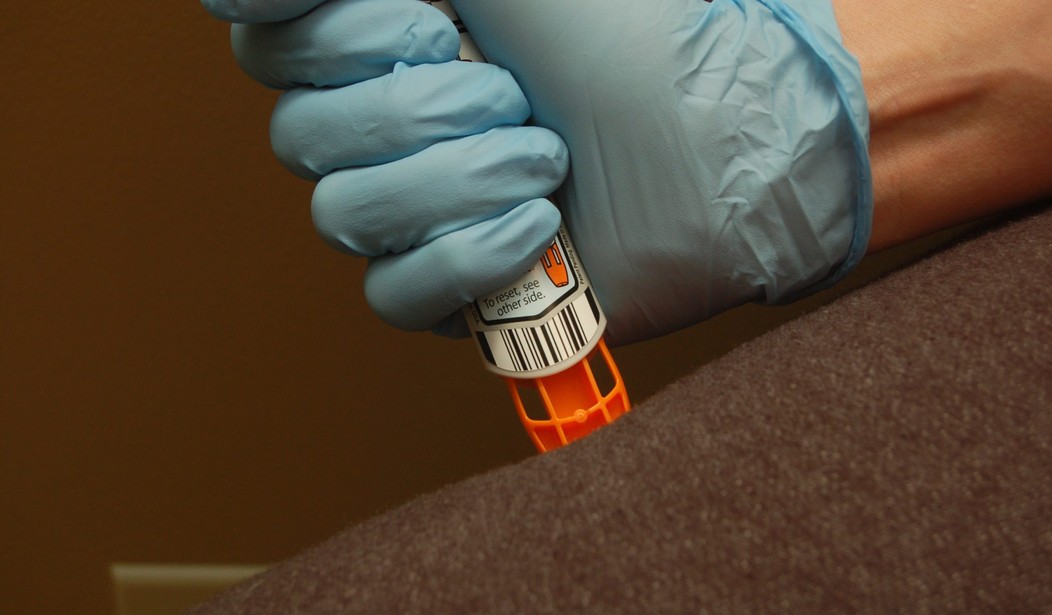The only way the term “Monopoly” doesn’t completely suck is if you’re talking about the board game, and you’re winning. In the real world, the lack of competition doesn’t do anything good. Companies without competition have an annoying tendency to do crappy things.
The latest example has a lot of parents upset in particular. Apparently, a 400 percent increase in the cost of a lifesaving medication tends to get them more than a little worked up:
Doctors and patients say the Mylan pharmaceutical company has jacked up the prices for an EpiPen — the portable device that can stop a potentially life-threatening allergic reaction — from around $100 in 2008 to $500 and up today.
That’s a hike of over 400 percent.
“Patients are calling and saying they can’t afford it,” said Dr. Douglas McMahon, an allergy specialist in Maplewood, Minnesota. “They’re between a rock and a hard place.”
Following a recall by Mylan’s chief competitor last year, the company now enjoys a near monopoly.
Because of aggressive marketing and branding campaigns, and lobbying for legislation that requires the product to be stocked in schools, they have a brand dominance equal to that of Kleenex, doctors say.
As someone who needs an EpiPen myself, I’m less than pleased with this development.
The loss of a competitor, coupled with demand remaining the same, invariably drives costs up. The Law of Supply and Demand is a real thing, after all.
This is why monopolies are never a good thing. While people are upset with Mylan for increasing costs, there’s not much anyone can do about it at this moment since they’re effectively the only supplier for the medication.
Obviously, the easiest solution to the problem is more competition. In fact, Dr. McMahon is working on becoming competition, which might say something about any bias he displays:
“When epinephrine only costs a few cents, but they’re going up to $500, personally I don’t think that’s ethically responsible,” said Dr. McMahon.
And he understands better than most what costs are involved: For the past few years he’s been developing his own, smaller version of the EpiPen, and trying to get it approved by the FDA and bring it to market. He estimates that process costs about $1.5 million. In 2015, Mylan’s profits from the sale of EpiPens rose to $1.2 billion.
McMahon says his device will retail for about $50.
[Emphasis added]
And here we see an allusion to half of the real problem. The Food and Drug Administration, charged with making sure medications are safe, also slows down the process in introducing competition for companies that have an effective monopoly like Mylan.
So Big Government regulations slow down the rise of living standards — thus harming the poor, not helping them. Who knew? (Hint: conservatives. They knew.)
Further, McMahon first needs to go $1.5 million in the hole — in addition to his research and development costs — to bring a product to market.
So Big Government regulations also prevent the little guy from innovating before he even gets started. Remember when the largest tobacco companies were thrilled to get hit with massive fines — because they were able to pay them, but smaller producers couldn’t? The little guys all went out of business or were sold off to the big guys for scrap.
Big Government regulations create monopolies, hurting the citizens they were intended to help? Again, who knew??? (Hint: Hillary Clinton and Bernie Sanders do not know. Please tell them.)
Despite the extensive knowledge regarding the safety of epinephrine, the FDA has no “fast track” option for competitors to Mylan. So now people who have deadly allergies will have to pay a lot more, for a lot longer.








Join the conversation as a VIP Member